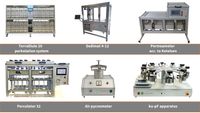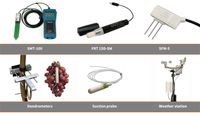UGT LAB AUTOMATION
In soil science, it is crucial to obtain accurate and reliable results. With laboratory measurements you determine various parameters under defined boundary conditions, which gives you a high repetition rate of the tests and thus a well-founded statistical evaluation. UGT has worked closely with scientist and research institutes to develop modern laboratory equipment and innovative laboratory automation solutions that allow you to analyze more samples in less time while improving the quality of your results.
- instrument for automated determination of particle size distribution in mineral soils
- determination of the saturated hydraulic conductivity on undisturbed soil
- determination of the unsaturated hydraulic conductivity ku and the pF curve (water tension curve)
- direct measurement of volume and density of solid substances
- automated extraction of percolate and determination of the cation exchange capacity
Permeameter according to Ketelsen
- soil unit with soil sensors (temperature, tension, water content), suction cups or suction plates, soil cooling system and weighing system
- fully automated operation with throughput of up to 24 samples / 24 h
- Continuous calculation of Ksat: automatic distinction between low/high Ksat samples for more effective runs
- internal storage of results & parameters, easy data export via USB/ email
- application: soil science
Sedimat 4-12
The Sedimat 4-12 is a laboratory instrument for the automated determination of the particle size distribution of the fine soil fractions (<0.002 mm to <0.063 mm) in mineral soils. You can choose the exact automated procedure according to DIN ISO 11277/ ISO 17892/ ASTM US nomenclature or freely configure your parameters.
- several soil sensors can be installed in lower unit to collect soil temperature, moisture & tension data
- Fully automated operation, drastic reduction of workload with high repeatability
- process 12 samples à 4 fractions within 24 hours
- exact control and recording of the measuring conditions (times, dipping depths, temperature)
- work according to your regulation or chose parameters freely
- application: soil science
TerraElute 20 percolation system
The TerraElute 20 is your fully automated solution for column elution /column leaching tests of soil and other solid material from landfills, construction sites, mining or other potentially contaminated sites. The TerraElute 20 Individually handles up to 40 columns for either simple elution of 1 fraction or extensive column elution tests of 4/7/more fractions (customization possible).
- automated real time adjustment of flow rate to meet your required residence times
- programmed start, automatic switch from saturation to percolation, and in between fractions
- easy check-in and check-out of individual columns via barcode scanner
- import of sample parameters for flow rate calculation via QR code from your LIMS, and full recording of all parameters
- easy data export for the test report
- application: soil science
Ku-pF MP10
Laboratory instrument for the automated determination of the unsaturated hydraulic conductivity ku and the pF curve (water tension characteristic curve) from up to 10 sample cylinders 250cm³, using the evaporation method.
- processes up to 10 soil sample cylinders simultaneously
- once set up, it operates without connection to your lab computer
- continuous data acquisition with minimal effort and obtain a continuous pF curve up to 900/1000 hPa
- also available as ku-pF SP (Single Place)
- application: soil science
Air/gas pycnometer
Pycnometer according to Langer, for the measurement of volume and density of soil samples/ powders/ bulk material. Application in soil science and industry for the determination of porosity and density, as well as the volume of irregular bodies.
- large measuring chamber of 2100 cm³
- integrated compressor for the use as air pycnometer, incl. connection hose for external gas supply (e.g. He, N)
- application: soil science
Percolator 32
Laboratory instrument for the fully automated extraction of percolate from soil samples, e.g. for the determination of the cation exchange capacity (CEC). Up to 4 sample trays each packed with 8 percolation tubes (32x250 mm) that contain the soil samples can be processed simultaneously. The percolate is collected in 250 ml Erlenmeyer flasks. The number of percolation cycles, duration and flow rates can be freely chosen, according to your procedures.
- process up to 32 soil samples simultaneously
- percolation cycles and volumes freely selectable with automatic rinsing mode
- application: soil science
Overhead shaker
For the homogenization of soil or liquid samples. One overhead shaker can be equipped with exchangeable trays of different samples number and size. A digital display shows the set and current revolution speed.
- freely adjustable up to 50 revolutions/min
- freely selectable number and size of samples (standard: 60 sample bottles à 100 ml / 72 sample bottles à 250 ml)
- application: soil science
SENSORS FOR SOIL SCIENCE & PLANT RESEARCH
UGT has developed sensors to determine water content, water tension, temperature and electrical conductivity of the soil. The measurements are used to better understand the behavior of soils and internal soil processes, as well as to evaluate soil fertility and assess plant growth and water requirements.
The water balance of an ecosystem is largely influenced by the water balance of the corresponding plants, while in turn this plant water balance is influenced by the ecosystem itself. An understanding of these interaction processes therefore forms the basis for water balance examinations and for studies of plant physiology, hence researchers use e.g. sensors measuring sap flow to record the transportation of water in stems or branches. Here are a few examples of sensors/devices we can deliver (and much more related to soil/plant science and hydrology):
- soil sampling devices like moor probe, gouge and root auger and soil sample rings
- full range tensiometers, soil moisture/temperature probes, soil calcimeter
- suction probes (with mobile vacuum & feed pump)
- sapflow sensors and stem/leaf psychrometers
- dendrometers (small/large diameter, but also fruit dendrometers)
- weather stations to record meteorological variables at a specific location (air pressure, temperature, precipitation, wind, humidity)
UGT Full Range Tensiometer FRT 15D and FRT 15D-SM
The full range tensiometer of UGT is a unique product that covers the entire measurement range of soil water potential/tension relevant for plants, up to 1500 kPa (pF 4.2). In contrast to other systems used for this measuring range, this sensor does not determine the tension as a derived variable, but via a direct pressure measurement. The measurement is reliable even in difficult media and arid regions.
- fast response and large measuring range
- available in tensiometer with temperature (FRT 15D) and tensiometer with temperature and soil moisture measurement (FRT 15D-SM)
- maintenance-free (no refilling is necessary after dry periods)
- frost-proof
- application: soil science
UGT SMT-100 soil moisture probe
Compact, functional and robust: The SMT-100 combines the advantages of a cost-effective FDR sensor system with the accuracy of a TDR. As standard, we deliver the sensor in a practical carrying case set with a reader for mobile measurement of volumetric soil moisture and soil temperature.
- determines volumetric water content and temperature
- wide measuring range, is maintenance-free and frost-proof
- fast response time and low sensitivity to salty soils
- data processing and storage works via an external logger ; SMT-100 is bus compatible, so multiple devices can be connected to one logger
- application: soil science
Sapflow sensors (SFM-5, SFM-5L)
Sap flow sensors are a key measurement approach to monitor tree water uptake throughout the year, or in response to drought, precipitation or changing groundwater levels. The SFM-5 is the most advanced sap flow sensor on the market, and at the same time easy to handle with SDI-12 output and energy-efficient enough to be connected to a battery-driven NB-IoT Box.
- available with 3 cm long needles (2 measurement points = SFM-5) or 6 cm long needles (5 measurement points = SFM-5L)
- dual method approach: combines heat ratio method for low flows and Tmax method for high flows with broad measurement range from -200 to 200 cm/hr
- additional parameter: stem water content
- combine with NB-IoT Box and easily input your individual tree data via online portal
- SDI-12 sensor, compatible with most loggers (as well as with NB-IoT/ LoRaWan)
- application: plant science
UGT suction probe systems
Suction probes, sometimes also called suction lysimeters, allow you to obtain soil pore water samples quickly and easily. UGT has many years of experience and offers a variety of specialized ceramic suction probes, pumps, accessories and full systems for your manual or automated soil water sampling campaigns in natural soil/ lysimeters/ in the lab.
- processes up to 10 soil sample cylinders simultaneously
- suction probes with or without shaft storage
- individual lengths according to the required installation depths
- reduced dead volume, optimized vacuum control
- with mobile pump/ automated time- or tension regulated vacuum pump system
- application: soil science
Dendrometers
Dendrometers determine the circumference, radius or diameter of plants. In combination with data loggers, they seamlessly record hydrographs of the plant diameter over days, months or years. Our product spectrum ranges from large measuring devices for trees to special, small versions for fruits and vegetables.
- small DD-S diameter dendrometer is specially developed for agricultural plants, small trees or individual branches (diameter of less than 5 cm)
- large DD-L diameter dendrometer for larger diameters of plants (3-30 cm)
- fruit dendrometer is a special dendrometer version for round measuring objects (measures change in diameter for total up to 11 cm without causing damage)
- application: plant science
Weather stations
Weather stations record meteorological variables at a specific location. They are used for weather observation and, in the long term, for climate research. Depending on the problem and task, a weather station consists of a combination of different measuring instruments. Available sensors:
- air temperature sensor (maximum, minimum thermometer)
- psychrometer (for determining air humidity)
- thermohygrograph
- precipitation gauge
- wind direction and wind speed sensor
- global radiation sensor
- other possible sensors: barometers for recording air pressure, sensors for recording sunshine duration, sensors for recording soil temperature (also at different depths), leaf wetness sensors

